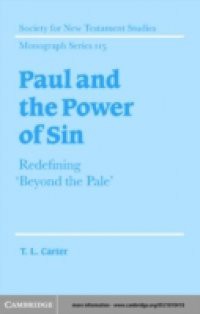Paul and the Power of Sin, first published in 2001, seeks to ground Paul's language of sin in the socio-cultural context of his original letters. T. L. Carter draws on the work of social anthropologist Mary Douglas to conduct a cross-cultural analysis of the symbolism of the power of sin in the letters, examining thoroughly Douglas' 'Grid and Group' model and defending its use as a heuristic tool for New Testament scholars. He uses this model to examine the social location of Paul and the communities to which he wrote and offers a fresh insight into key passages from 1 Corinthians, Galatians and Romans. Carter concludes that an important part of Paul's purpose was to safeguard the position of law-free Gentile believers by redrawing social boundaries along eschatological rather than ethnic lines.

